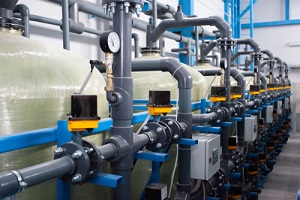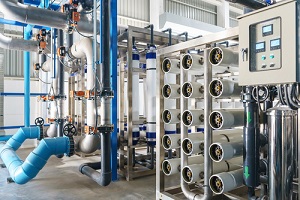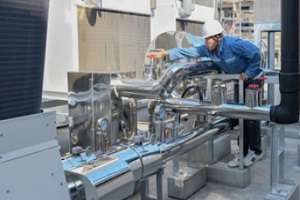 Commercial water treatment is an essential health and safety service. It can create purified, filtered water for both human consumption and home, business or industrial operations. Water is central to many industrial production functions, and often necessitates clean, treated water. Likewise, purified water can be used for health, cooking, sanitation and cleaning.
Commercial water treatment is an essential health and safety service. It can create purified, filtered water for both human consumption and home, business or industrial operations. Water is central to many industrial production functions, and often necessitates clean, treated water. Likewise, purified water can be used for health, cooking, sanitation and cleaning.
No matter your purified water needs, commercial water treatment is the most effective technique for water purification on a large scale. While some water treatment units are on the expensive side, they are often much more efficient, durable, and precise.
What is Commercial Water Treatment?
Commercial water treatment involves the process of creating pure, filtered water from an unclean source. Many of these steps are handled by large scale water companies. The steps and techniques involved in the process can vary, but the primary function is treating and purifying water for use in settings that require a clean water source. Common water sources tend to contain impurities, making the treatment process essential.
Commercial water treatment addresses several factors. We detail several of those factors below:
pH Level
The pH level tells you how acidic or basic the water is. If water is too acidic or basic, it may not be safe to use or consume. The pH of balanced alkaline water starts at 7, which is neutral – neither acidic or basic. If the pH goes below 7, it is considered acidic. Water treatment techniques use minerals to increase and balance acidic water’s pH. Normal pH limits are 6.5 -9.0 for consumption as well as discharge.
Water Hardness
The hardness of water refers to the amount of dissolved calcium and magnesium that is present in the water. Water hardness is also determined by the presence of heavy metals, which can be damaging to machinery that uses water as a part of its processes. Commercial water treatment machines often have softening or filteration systems that reduce and check the hardness of the water.
Total Dissolved Solids (TDS)
 Water from public and well sources can contain organic and inorganic substances that are both harmful to consume or use in many home or commercial processes. Metals, minerals, and salts must be filtered to create purified water that is safe for human use.
Water from public and well sources can contain organic and inorganic substances that are both harmful to consume or use in many home or commercial processes. Metals, minerals, and salts must be filtered to create purified water that is safe for human use.
Dissolved solids cannot be removed by filtration and are generally monitored with the use of a conductivity meter. While TDS itself is not harmful, some minerals which could be identified with further testing certainly could be.
Factors That Affect Water Treatment Cost
Water treatment systems come in three classes: basic water treatment systems (Chemical), purification and separation systems (Equipment), and wastewater treatment systems (reuse water and removal of waste from used water). The type of equipment which requires water treatment has become increasingly more demanding and will influence the price of treatment. Below is a summary of common factors that can influence or increase water treatment costs.
Water Quality
The first thing to consider is the water source in need of treatment. In order to understand the type of chemical treatment or other water treatment equipment needed, thoroughly analyze the contents of the water source. Learn what chemicals, ions and minerals are present in the water.
If the water source is contaminated, you may need more sophisticated water treatment equipment – which can be costly.It will also be important to understand what the water quality is required after treatment has been introduced.
Desired Purity
Some use cases, such as drinking water or water used in sensitive pharmaceutical equipment , may require the water source to be free of metals and maintain a precise pH level. In these cases, understanding the thresholds that you need to adhere to is essential for getting an accurate quote for your water treatment system.
Additionally, some pharmaceutical uses may need the water to adhere to regulatory standards. This requires the set-up of a targeted system, often expensive, that pinpoints the necessary water quality.
Flow Rate
 The flow rate of your system influences its treatment costs, as well. Lower flow rates often mean lower costs. But this is not true for every system, as some systems use flexible flow rates that may not affect the cost as much. Keep in mind that the higher flow rate capacity will most likely translate to a higher project budget.
The flow rate of your system influences its treatment costs, as well. Lower flow rates often mean lower costs. But this is not true for every system, as some systems use flexible flow rates that may not affect the cost as much. Keep in mind that the higher flow rate capacity will most likely translate to a higher project budget.
Understanding these factors can help you to get the water treatment technology that you need for your unique use case. Moreover, understanding the flow rate, desired purity and regulations can help you save money. For more information on picking the best commercial water treatment for your organization’s needs, reach out to the experts at Tower Water today at 212-518-6547 or visit their website.
